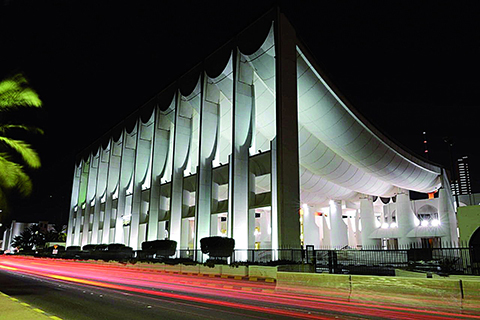 The National Assembly
The National AssemblyKUWAIT: Kuwaitis are set to head to the polls today to elect 50 members of the National Assembly in parliamentary elections that will set in motion parliament's 15th legislative term. Some 293 candidates, are vying for the much coveted seat in parliament, where the 483,186-strong electorate will vote for 50 candidates representing the nation's electorate constituencies, under the watchful eye of 15,000 security forces.
Moreover, males comprise 47.68 percent of the electorate, while females make up 52.31 percent. The elections are taking place as per law number 42/2006 which deals with reshaping the electoral constituencies, where each constituency will field a total of 10 candidates in which the electorate can only vote for one candidate per constituency. On October 16, His Highness the Amir Sheikh Sabah Al-Ahmad Al-Jaber Al-Sabah issued a decree dissolving parliament, citing volatile regional conditions and mounting security challenges.
In 1963, Kuwait's inaugural parliament was elected in an event that ushered in democracy, where 205 candidates vied for 50 seats in the country's first parliament. On December 16, 1980, by virtue of an Amiri decree, Kuwait was divided into 25 electoral constituencies, a system that produced seven legislative terms. As per clause number 80 of the constitution, parliament is made up of 50 MPs who are chosen through parliamentary elections.
Meanwhile, on August 1, 2006, His Highness the Amir issued law number 42/2006, which reshaped the electoral constituencies in a way where voters are permitted to vote for four candidates per the constituency they are registered in.
On May 17, 2008, the first election under that system was held after parliament was dissolved in 2006, followed by elections held in 2009 under the same format. In February 2012, elections took place using the same system. However, after parliament was dissolved in 2012, the system was amended again where the electorate can only vote for one candidate in dive different electoral constituencies.
As per clause 83 of the constitution, a single parliamentary term lasts for four years, where it is authorized to issue a raft of legislative and inspective decisions. However, no law can be implemented without the approval of Parliament and His Highness the Amir. Furthermore, the National Assembly's legislative authority is tasked with implementing legal decisions, including political ones, where no law can be finalized without the approval of Parliament and His Highness the Amir.
Parliamentary decisions regarding financial affairs typically deal with the national budget, in addition to that of the Parliament. His Highness the Amir reserves the right to dissolve parliament with a law clarifying the reasons behind the dissolution, where elections are then held no later than two months after the dissolution.
As per clause 31 of election laws, ballots open from 8:00 a.m. to 8:00 p. m., however, if the entire electorate have casted their votes before the end of the allotted period, then ballots will officially close, subsequently initiating the vote tallying process. There are a total of 89 delegates in the First Constituency, divided over 16 schools. The Second Constituency features 66 delegates, with 96 and 143 delegates in the Third and Fourth Constituencies, respectively. Lastly, the Fifth Constituency comprises 148 delegates. - KUNA










